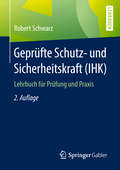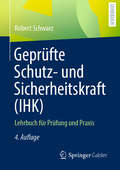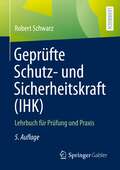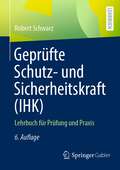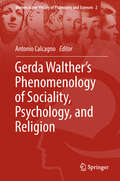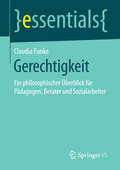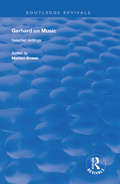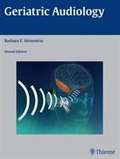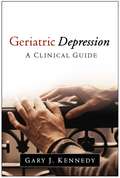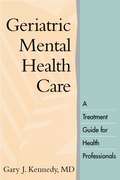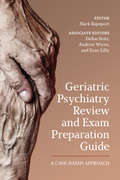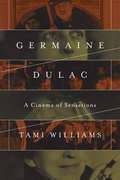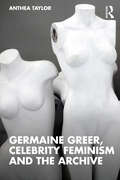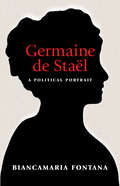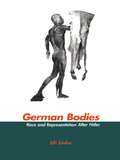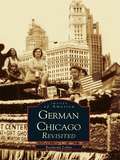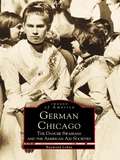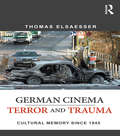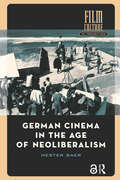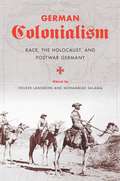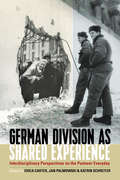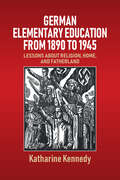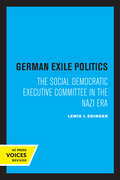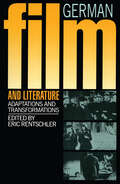- Table View
- List View
Geprüfte Schutz- und Sicherheitskraft (IHK)
by Robert SchwarzDas vorliegende Lehrbuch richtet sich an alle, die die Prüfung zur Schutz- und Sicherheitskraft vor einer Industrie- und Handelskammer ablegen wollen, und eignet sich zugleich als Nachschlagewerk für die Praxis sowie zur regelmäßigen Weiterbildung. Die überarbeitete und aktualisierte 2. Auflage wurde dem aktuellen Rechtsstand 2018 angepasst und behandelt systematisch alle prüfungsrelevanten Fachgebiete. Besonderen Wert hat der Autor auf den oft als schwierig empfundenen Rechtsteil gelegt: Zahlreiche Abbildungen und Beispiele veranschaulichen die Inhalte und ihre Bedeutung für die Praxis, erleichtern das Stoffverständnis und das Lernen: Die ideale Prüfungsvorbereitung - Schritt für Schritt.
Geprüfte Schutz- und Sicherheitskraft (IHK): Lehrbuch für Prüfung und Praxis
by Robert SchwarzDas vorliegende Lehrbuch richtet sich an alle, die die Prüfung zur Schutz- und Sicherheitskraft vor einer Industrie- und Handelskammer ablegen wollen, und eignet sich zugleich als Nachschlagewerk für die Praxis sowie zur regelmäßigen Weiterbildung. Die aktualisierte 4. Auflage wurde dem aktuellen Rechtsstand im Frühjahr 2020 angepasst, insbesondere wurden die aktuellen Bestimmungen im Gewerberecht - GewO und BewachV - eingearbeitet. Das Werk behandelt systematisch alle prüfungsrelevanten Fachgebiete. Besonderen Wert hat der Autor auf den oft als schwierig empfundenen Rechtsteil gelegt: Zahlreiche Abbildungen und Beispiele veranschaulichen die Inhalte und ihre Bedeutung für die Praxis, erleichtern das Stoffverständnis und das Lernen: Die ideale Prüfungsvorbereitung - Schritt für Schritt.
Geprüfte Schutz- und Sicherheitskraft (IHK): Lehrbuch für Prüfung und Praxis
by Robert SchwarzDas vorliegende Lehrbuch richtet sich an alle, die die Prüfung zur Schutz- und Sicherheitskraft vor einer Industrie- und Handelskammer ablegen wollen, und eignet sich zugleich als Nachschlagewerk für die Praxis sowie zur regelmäßigen Weiterbildung. Die gründlich durchgesehene und verbesserte 5. Auflage entspricht dem aktuellen Rechtsstand 2020/2021 und berücksichtigt auch die Bestimmungen im Gewerberecht – GewO und BewachV. Das Werk behandelt systematisch alle prüfungsrelevanten Fachgebiete. Besonderen Wert hat der Autor auf den oft als schwierig empfundenen Rechtsteil gelegt: Zahlreiche Abbildungen und Beispiele veranschaulichen die Inhalte und ihre Bedeutung für die Praxis, erleichtern das Stoffverständnis und das Lernen: Die ideale Prüfungsvorbereitung – Schritt für Schritt.
Geprüfte Schutz- und Sicherheitskraft (IHK): Lehrbuch für Prüfung und Praxis
by Robert SchwarzDas vorliegende Lehrbuch richtet sich an alle, die die Prüfung zur Schutz- und Sicherheitskraft vor einer Industrie- und Handelskammer ablegen wollen, und eignet sich zugleich als Nachschlagewerk für die Praxis sowie zur regelmäßigen Weiterbildung. Die überarbeitete 6. Auflage entspricht dem aktuellen Rahmenstoffplan vom Mai 2021 und behandelt systematisch alle prüfungsrelevanten Fachgebiete. Besonderen Wert hat der Autor auf den oft als schwierig empfundenen Rechtsteil gelegt: Zahlreiche Abbildungen und Beispiele veranschaulichen die Inhalte und ihre Bedeutung für die Praxis, erleichtern das Stoffverständnis und das Lernen: Die ideale Prüfungsvorbereitung – Schritt für Schritt.
Gerda Walther’s Phenomenology of Sociality, Psychology, and Religion (Women in the History of Philosophy and Sciences #2)
by Antonio CalcagnoThis book explores the philosophical writings of Gerda Walther (1897–1977). It features essays thatrecover large parts of Walther’s oeuvre in order to show her contribution to phenomenologyand philosophy. In addition, the volume contains an English translation of part of hermajor work on mysticism.The essays consider the interdisciplinary implications of Gerda Walther’s ideas. A student of Edmund Husserl, Edith Stein, and Alexander Pfänder, she wrotefoundational studies on the ego, community, mysticism and religion, and consciousness.Her discussions of empathy, identification, the ego and ego-consciousness,alterity, God, mysticism, sensation, intentionality, sociality, politics, and woman arerelevant not only to phenomenology and philosophy but also to scholars of religion, women’s and gender studies, sociology, political science, and psychology.Gerda Walther was one of the important figures of the early phenomenologicalmovement. However, as a woman, she could not habilitate at a Germanuniversity and was, therefore, denied a position. Her complete works have yet to bepublished. This ground-breaking volume not only helps readers discover a vital voice but it also demonstrates the significant contributions of women to early phenomenological thinking.
Gerechtigkeit: Ein philosophischer Überblick für Pädagogen, Berater und Sozialarbeiter (essentials)
by Claudia FunkeIn diesem essential gibt Claudia Funke einen #65533;berblick #65533;ber die Philosophie der Gerechtigkeit. Die Autorin erg#65533;nzt die philosophische Diskussion mit Praxisbeispielen und Werkzeugen f#65533;r die eigene Berufspraxis. Dabei wird auch die Frage des eigenen Gerechtigkeitsverst#65533;ndnisses miteinbezogen. Auf dieser Grundlage diskutiert das essential, welcher Gerechtigkeitsbegriff f#65533;r die Arbeit mit Menschen besonders hilfreich ist. In den Fokus r#65533;ckt Gerechtigkeit als eine aushandelbare Gr#65533;#65533;e. Es werden im Folgenden verschiedene Formen des gesellschaftlichen Aushandelns vorgestellt.
Gerhard on Music: Selected Writings
by Meirion Bowen Roberto GerhardThis title was first published in 2000: Catalan-born composer Roberto Gerhard (1896-1970) left significant legacies - both musical and documentary. Exiled in Cambridge with the onset of the Spanish Civil War, he gradually achieved wide recognition by performers and conductors, in both Britain and America, as a composer whose music was essential to the modern repertoire. In this work, the author collects many of the composer's articles, reviews, lectures and broadcasts to demonstrate the full extent and continuity of Gerhard's artistic and creative thinking. The writings have been arranged thematically to emphasize the evolution of Gerhard's musical interests. His attachment to Spanish and Catalonian traditions broadened into a fascination with folk music of all kinds. His studies with Schoenberg in the mid 1920s gave him the key to his own creative individuality; thereafter, his imaginative vitality led him eventually to experiment with electronic and concrete music and he continued breaking new ground, even in his final years.
Geriatric Audiology
by Barbara WeinsteinCompletely revised and updated, Geriatric Audiology, Second Edition is a unique handbook that provides audiologists, speech language pathologists, and doctoral students in audiology with evidence-based, clinical guidance on evaluating and treating hearing loss in older adults. Focusing solely on geriatric audiology, this new edition contains the latest information on the demographics of aging as well as the biological, sociological, and psychological factors that affect geriatric hearing loss and its ramifications.
Geriatric Depression
by Gary J. KennedyWritten for a broad range of mental health professionals, this book explains why depression can be challenging to treat in older adults and describes the most effective interventions. Noted geriatric psychiatrist Gary J. Kennedy draws on extensive clinical experience and research to present current best practices in pharmacotherapy, psychotherapy, other psychosocial and lifestyle interventions, and electroconvulsive therapy. Depressive disorders complicated by psychosis, mania, dementia, and bereavement are addressed in detail, as is suicide prevention. Kennedy emphasizes the importance of integrating care across service settings and building strong partnerships with patients and their families. Quick-reference tables throughout the book distill critical elements of intervention. See also the author's award-winning Geriatric Mental Health Care: A Treatment Guide for Health Professionals, which provides a framework for treating the most frequently encountered psychiatric problems in this population.
Geriatric Mental Health Care
by Gary J. KennedyThis essential guide is designed for mental health practitioners and primary care providers without advanced training in geriatric psychiatry. Leading physician and educator Gary J. Kennedy sets forth a clear framework for understanding the interplay of medical, psychological, and social factors in frequently encountered problems among older adults. Clear guidelines are delineated for assessing and treating such conditions as depression and anxiety, dementia, psychosis and mania, sleep disturbances, personality and somatoform disorders, substance abuse, and suicidality. Throughout, Kennedy focuses on ways to sustain seniors' independence and overall quality of life while enhancing their adaptive capacities. Psychopharmacological principles are presented with an emphasis on safety, simplicity, and effectiveness, and the beneficial applications of individual, marital, family, and group psychotherapies are also addressed. Other topics covered include sexuality in old age, problems of elder abuse and neglect, collaborating with family members and other caregivers in medical and nonmedical settings, and legal and ethical issues in treatment.
Geriatric Psychiatry Review and Exam Preparation Guide: A Case-Based Approach
by Andrew Wiens Dallas Seitz Evan Lilly Mark RapoportGeriatric psychiatry is a relatively young discipline within the field of North American psychiatry. The development of a workforce to meet the needs of an aging population has been identified as an urgent priority, but there is still much we don’t know about fulfilling the mental health needs of older adults. For Mark J. Rapoport, geriatric psychiatrists must assess and treat patients today in face of the limitations of what we know, but also be armed with enthusiasm to create novel ways of impacting on the quality of life of older patients with mental illness. The chapters in this book include case scenarios, concise point-form summaries of diagnostic and treatment approaches, up-to-date evidence syntheses, discussions of controversies, and a series of practical and thought-provoking questions and answers. Geriatric Psychiatry is a succinct and advanced review of geriatric psychiatry that will help clinicians improve the psychiatric care of an aging population.
Germaine Dulac: A Cinema of Sensations
by Tami WilliamsBest known for directing the Impressionist classic The Smiling Madame Beudet and the first Surrealist film The Seashell and the Clergyman, Germaine Dulac, feminist and pioneer of 1920s French avant-garde cinema, made close to thirty fiction films as well as numerous documentaries and newsreels. Through her filmmaking, writing, and cine-club activism, Dulac's passionate defense of the cinema as a lyrical art and social practice had a major influence on twentieth century film history and theory. In Germaine Dulac: A Cinema of Sensations, Tami Williams makes unprecedented use of the filmmaker's personal papers, production files, and archival film prints to produce the first full-length historical study and critical biography of Dulac. Williams's analysis explores the artistic and sociopolitical currents that shaped Dulac's approach to cinema while interrogating the ground breaking techniques and strategies she used to critique conservative notions of gender and sexuality. Moving beyond the director's work of the 1920s, Williams examines Dulac's largely ignored 1930s documentaries and newsreels establishing clear links with the more experimental impressionist and abstract works of her early period. This vivid portrait will be of interest to general readers, as well as to scholars of cinema and visual culture, performance, French history, women's studies, queer cinema, in addition to studies of narrative avant-garde, experimental, and documentary film history and theory.
Germaine Greer, Celebrity Feminism and the Archive
by Anthea TaylorGermaine Greer, Celebrity Feminism and the Archive, the first scholarly book on this internationally renowned feminist, draws upon Greer’s largely unexplored archive to demonstrate her impact on readers and viewers since the 1970s.Across many decades in the limelight and through multiple media forms, the provocative Greer has worked to shape audience understandings of gender, sexuality, and feminism. Through deep engagement with archival material, Anthea Taylor offers a compelling reassessment of Greer’s celebrity feminist labour and its effects over time. Examining archived letters from fans, anti-fans, and those in between, this innovative volume shows how and why readers and viewers have come to affectively invest – or disinvest – in this iconoclastic feminist. Advancing debates about the social and political function of celebrity, Germaine Greer, Celebrity Feminism and the Archive is essential reading for scholars in Gender Studies, History, Archival Studies, and Media and Cultural Studies.
Germaine de Stael: A Political Portrait
by Biancamaria FontanaGermaine de Staël (1766-1817) is perhaps best known today as a novelist, literary critic, and outspoken and independent thinker. Yet she was also a prominent figure in politics during the French Revolution. Biancamaria Fontana sheds new light on this often overlooked aspect of Staël's life and work, bringing vividly to life her unique experience as a political actor in a world where women had no place.The banker's daughter who became one of Europe's best-connected intellectuals, Staël was an exceptionally talented woman who achieved a degree of public influence to which not even her wealth and privilege would normally have entitled her. During the Revolution, when the lives of so many around her were destroyed, she succeeded in carving out a unique path for herself and making her views heard, first by the powerful men around her, later by the European public at large. Fontana provides the first in-depth look at her substantial output of writings on the theory and practice of the exercise of power, setting in sharp relief the dimension of Staël's life that she cared most about--politics. She was fascinated by the nature of public opinion, and believed that viable political regimes were founded on public trust and popular consensus. Fontana shows how Staël's ideas were shaped by the remarkable times in which she lived, and argues that it is only through a consideration of her political insights that we can fully understand Staël's legacy and its enduring relevance for us today.
German Bodies: Race and Representation After Hitler
by Uli LinkeFirst published in 1999. Routledge is an imprint of Taylor & Francis, an informa company.
German Chicago: Revisited (Images of America)
by Raymond LohneGerman Chicago Revisited follows the photographic study which began in German Chicago: The Danube Swabians and the American Aid Societies. With this latest title in the Images of America series, historian and photographer Raymond Lohne crafts another volume about a group of American citizens who preserve their rich heritage with unwavering effort.This book will give readers a glimpse into the life of a close-knit and highly active community, revealing groups like the Kerneir Pleasure Club, the American Aid Society, and the Society of the Danube Swabians. The German musical life of the city is featured, as is the Karneval season and other year-round festivities and celebrations of the Deutsch-Americans of Chicago and its suburbs.
German Chicago: The Danube Swabians and the American Aid Societies
by Raymond LohneIn German Chicago: The Danube Swabians and the American Aid Societies, historian Raymond Lohne presents the Germans who came to be called the Donauschwaben and their American counterparts. This amazing photographic collection of over 200 historic images has been gathered through the efforts of the author and survivors of the Expulsion, as well as numerous German-American societies and individuals throughout the nation.
German Cinema - Terror and Trauma: Cultural Memory Since 1945
by Thomas ElsaesserIn German Cinema – Terror and Trauma Since 1945, Thomas Elsaesser reevaluates the meaning of the Holocaust for postwar German films and culture, while offering a reconsideration of trauma theory today. Elsaesser argues that Germany's attempts at "mastering the past" can be seen as both a failure and an achievement, making it appropriate to speak of an ongoing 'guilt management' that includes not only Germany, but Europe as a whole. In a series of case studies, which consider the work of Konrad Wolf, Alexander Kluge, Rainer Werner Fassbinder, Herbert Achterbusch and Harun Farocki, as well as films made in the new century, Elsaesser tracks the different ways the Holocaust is present in German cinema from the 1950s onwards, even when it is absent, or referenced in oblique and hyperbolic ways. Its most emphatically "absent presence" might turn out to be the compulsive afterlife of the Red Army Faction, whose acts of terror in the 1970s were a response to—as well as a reminder of—Nazism’s hold on the national imaginary. Since the end of the Cold War and 9/11, the terms of the debate around terror and trauma have shifted also in Germany, where generational memory now distributes the roles of historical agency and accountability differently. Against the background of universalized victimhood, a cinema of commemoration has, if anything, confirmed the violence that the past continues to exert on the present, in the form of missed encounters, retroactive incidents, unintended slippages and uncanny parallels, which Elsaesser—reviving the full meaning of Freud’s Fehlleistung—calls the parapractic performativity of cultural memory.
German Cinema in the Age of Neoliberalism (Film Culture in Transition)
by Hester BaerThis book presents a new history of German film from 1980-2010, a period that witnessed rapid transformations, including intensified globalization, a restructured world economy, geopolitical realignment, and technological change, all of which have affected cinema in fundamental ways. Rethinking the conventional periodization of German film history, Baer posits 1980-rather than 1989-as a crucial turning point for German cinema's embrace of a new market orientation and move away from the state-sponsored film culture that characterized both DEFA and the New German Cinema. Reading films from East, West, and post-unification Germany together, Baer argues that contemporary German cinema is characterized most strongly by its origins in and responses to advanced capitalism. Informed by a feminist approach and in dialogue with prominent theories of contemporary film, the book places a special focus on how German films make visible the neoliberal recasting of gender and national identities around the new millennium.
German Colonialism: Race, the Holocaust, and Postwar Germany (Routledge Studies In Modern European History Ser.)
by Mohammad Salama Eds. Langbehn VolkerMore than half a century before the mass executions of the Holocaust, Germany devastated the peoples of southwestern Africa. While colonialism might seem marginal to German history, new scholarship compares these acts to Nazi practices on the Eastern and Western fronts. With some of the most important essays from the past five years exploring the "continuity thesis," this anthology debates the links between German colonialist activities and the behavior of Germany during World War II. Some contributors argue the country's domination of southwestern Africa gave rise to perceptions of racial difference and superiority at home, building upon a nascent nationalism that blossomed into National Socialism and the Holocaust. Others remain skeptical and challenge the continuity thesis. The contributors also examine Germany's colonial past with debates over the country's identity and history and compare its colonial crimes with other European ventures. Other issues explored include the denial or marginalization of German genocide and the place of colonialism and the Holocaust within German and Israeli postwar relations.
German Division as Shared Experience: Interdisciplinary Perspectives on the Postwar Everyday
by Jan Palmowski Erica Carter Katrin SchreiterDespite the nearly three decades since German reunification, there remains little understanding of the ways in which experiences overlapped across East-West divides. German Division as Shared Experience considers everyday life across the two Germanies, using perspectives from history, literary and cultural studies, anthropology and art history to explore how interconnections as well as fractures between East and West Germany after 1945 were experienced, lived and felt. Through its novel approach to historical method, the volume points to new understandings of the place of narrative, form and lived sensibility in shaping Germans’ simultaneously shared and separate experiences of belonging during forty years of division from 1945 to 1990.
German Division as Shared Experience: Interdisciplinary Perspectives on the Postwar Everyday
by Katrin Schreiter Erica Carter, Jan PalmowskiDespite the nearly three decades since German reunification, there remains little understanding of the ways in which experiences overlapped across East-West divides. German Division as Shared Experience considers everyday life across the two Germanies, using perspectives from history, literary and cultural studies, anthropology and art history to explore how interconnections as well as fractures between East and West Germany after 1945 were experienced, lived and felt. Through its novel approach to historical method, the volume points to new understandings of the place of narrative, form and lived sensibility in shaping Germans’ simultaneously shared and separate experiences of belonging during forty years of division from 1945 to 1990.
German Elementary Education from 1890 to 1945: Lessons about Religion, Home, and Fatherland
by Katharine KennedyIn this innovative analysis of German elementary education, Katharine Kennedy uses textbooks, curricula, and pedagogical texts to trace continuities and changes in the lessons taught in the elementary schools of Wilhelmine, Weimar, and Nazi Germany. Children in all three periods were exposed to recurring texts that reinforced attachment to God, region, and fatherland. However, they also encountered evolving symbols of the nation and shifting ideas about the identity of Germany and the German people. By blending lessons on Hitler, race, and heredity with traditional narratives, Nazi education conveyed its ideology under the cloak of virtue, patriotism, and normality. It provides a compelling example of how a dictatorship manipulates religion and tradition to legitimize a brutal, lawless, and racist regime.
German Exile Politics: The Social Democratic Executive Committee in the Nazi Era
by Lewis J. EdingerThis title is part of UC Press's Voices Revived program, which commemorates University of California Press’s mission to seek out and cultivate the brightest minds and give them voice, reach, and impact. Drawing on a backlist dating to 1893, Voices Revived makes high-quality, peer-reviewed scholarship accessible once again using print-on-demand technology. This title was originally published in 1956.
German Film & Literature
by Eric RentschlerFirst Published in 1986. Routledge is an imprint of Taylor & Francis, an informa company.
